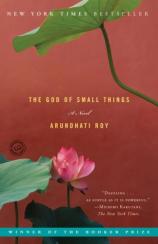Reading Group Guide
Discussion Questions
The God of Small Things

1. Discuss the narrative structure of The God of Small Things, which intertwines scenes from the past and the present, and Arundhati Roy’s writing style. Why do you suppose the author chose not to unfold the narrative in a more linear way?
2. Share your thoughts about the novel’s setting and the impression the author creates of rural India. What universal themes are there in The God of Small Things that transcend the specific time and place in which the story is set?
3. Ammu is described as being "an unmixable mix. The infinite tenderness of motherhood and the reckless rage of a suicide bomber." How are these dual aspects of her personality evident throughout the story? Is Ammu a good mother? Why or why not?
4. How would you characterize Baby Kochamma? Why does she not only take pleasure in other peoples’ grief and misfortune but actively seeks to perpetuate it? Why does Baby Kochamma harbor such resentment toward Ammu and the twins in particular?
5. Describe the dynamics of the Ipe household, including Mammachi’s relationship with each of her children. How do these dynamics change once Margaret Kochamma and Sophie Mol arrive?
6. Pappachi’s Moth "tormented him and his children and his children’s children." What is the significance of Pappachi’s Moth, both to him and, by extension, to his family? Why is the image of the Moth associated most often with Rahel?
7. Discuss the class differences among the characters in the novel, using Ammu’s and Velutha’s families as examples. To what extent are their lives shaped by the caste into which they’re born? Why does Vellya Paapen go to Mammachi and reveal what he knows about his son and Ammu, and why is he willing to kill Velutha because of it?
8. Discuss the chain of events that led to both Sophie Mol’s accident and Velutha’s murder. Why does Margaret Kochamma blame Estha for her daughter’s drowning, while Chacko vents his rage at Ammu? Does anyone bear responsibility for Sophie Mol’s death, or was it simply a tragic accident?
9. How do religion and politics factor into the characters’ lives? Why does Comrade Pillai tell Inspector Mathew that Velutha does not have the backing of his political party? Would the Comrade’s support have made a difference in saving Velutha’s life?
10. Baby Kochamma, Mammachi, and Kochu Maria devise a plan to save the family’s reputation by claiming that Ammu was raped by Velutha. "It wasn’t entirely their fault, though, that the whole thing spun out of control like a deranged top." Are they accountable, at least in part, for Velutha’s murder? Why or why not?
11. How is marriage portrayed in The God of Small Things, particularly that of Mammachi and Pappachi? In general, how are the women in the story treated by men? What examples are there of double standards, such as Mammachi’s willingness to overlook Chacko’s indiscretions but not Ammu’s affair?
12. Why does Baby Kochamma manipulate Estha and Rahel into falsely confessing that they had been kidnapped by Velutha? Later Rahel questions whether they were deceived into doing what they did and ultimately conclude that she and Estha "knew that they had been given a choice." Is it fair to lay blame on these two children for believing they needed to save their mother? How does this incident continue to affect Rahel into adulthood?
13. The Love Laws "lay down who should be loved. And how. And how much." Which characters in the book defy the Love Laws? Were you surprised at Rahel and Estha’s intimacy towards the end of the novel? Why or why not?
14. After Velutha’s death, it is "the end of living" for Ammu, Estha, and Rahel. How is this sentiment born out for each of these three characters? Is there hope yet for Estha and Rahel?
15. What does Rahel, as an adult, see differently about the circumstances surrounding that defining day of her childhood? In what ways has Ayemenem changed during the years of her absence–her family’s house, the river, the factory, the History House? Has anything stayed the same?
16. What is your overall impression of The God of Small Things? Why do you suppose the author chose to conclude with a scene depicting Ammu and Velutha making love by the river?
The God of Small Things
- Publication Date: December 16, 2008
- Genres: Fiction, Historical Fiction
- Paperback: 352 pages
- Publisher: Random House Trade Paperbacks
- ISBN-10: 0812979656
- ISBN-13: 9780812979657








